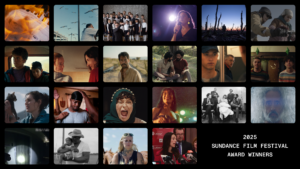Hilla Medalia, Director, Dancing In Jaffa
I make films to share them with people, and personally one of the most interesting and important aspects is to see and feel the audience’s reaction to my work, and to engage with them in dialogue. When Film Forward chose to include Dancing in Jaffa in this year’s program, I was especially excited to have the opportunity to share the film and be present at these places where the audience wouldn’t otherwise have a chance to see the film, and I wouldn’t have had a chance to meet these people.
I have been thinking about the themes Dancing in Jaffa presents and the ways they are relevant to the people who live in San Diego and Tijuana. Minority groups struggling against discrimination and prejudice exist everywhere, and most definitely here with many immigrants and the border that is so close and so dominate. Borders, both physical and invisible, exist in every community, and here the border is very present in people’s lives.
Our very first screening was incredible. We screened the film to the San Diego Creative and Performing Arts High School to an audience of 80 students. Despite the small screen, the students were completely enthralled the whole time. Before the screening I asked them what comes to mind when they hear Palestinian-Israeli conflict. They all were thinking words along the line of “war”, “fighting”, “blood”, etc. When the film was over I asked them the same question again and it was fascinating to see how their association shifted and the words that came to their minds were “lack of communication”, “respect”, and “understanding”. It was fascinating to see how their perception shifted to the personal and human, and even more so, how the students were able to identify with the characters and find their own struggles within the story of the Jaffa’s kids. One of the students said that the theme of this film is breaking barriers and shared with us that there are immigrants in San Diego that experience the same issues we see in the film.
Tijuana was the place where I felt sharing our work with the audience was most meaningful. The city feels like it has been forgotten and stigmatized and the border is so central in people’s lives. I was surprised to see the level of education in the public high school we visited. I felt there is a great need of exposing these kids to the world outside of their own community as well as discussing issues like discrimination and racism and feeling good in your own skin. I hope our films created a starting point for the dialogue that each of them is entitled to equal opportunity, and not only on paper, and the idea that art has the power to make change in a community with deep-seated issues of segregation, resentment, and prejudice.
At the end of our second screening in Tijuana, a woman came to me and said that for her the most incredible thing in the film is the awakening of the children from a very simple act – dancing. This awakening would change the lives of the kids forever, and would also awaken her forever. I was very moved by the impact the film had on her. It reminded me why I make films.




